
Hendry County is a county in the Florida Heartland region of the U.S. state of Florida. As of the 2020 census, the population was 39,619, a 1.2% increase from 39,140 at the 2010 census. The county is majority-Hispanic or Latino. Its county seat is LaBelle.
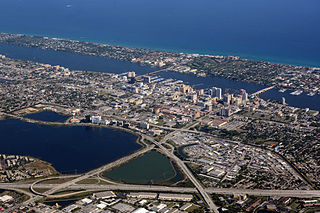
Palm Beach County is a county in the southeastern part of Florida, located in the Miami metropolitan area. It is Florida's third-most populous county after Miami-Dade County and Broward County and the 26th-most populous in the United States, with 1,492,191 residents as of the 2020 census. Its county seat and largest city is West Palm Beach, which had a population of 117,415 as of 2020. Named after one of its oldest settlements, Palm Beach, the county was established in 1909, after being split from Miami-Dade County. The county's modern-day boundaries were established in 1963.

Boynton Beach is a city in Palm Beach County, Florida, United States. It is situated about 57 miles (92 km) north of Miami. The 2020 census recorded a population of 80,380. Boynton Beach is located in the Miami metropolitan area, which was home to 6,138,333 people at the 2020 census. The city is named after Nathan Boynton, a Civil War major and Michigan politician who became one of the first settlers in the area in 1895. Boynton Beach is located north of Delray Beach, south of Hypoluxo and Lantana, and east of Golf, while the municipalities of Briny Breezes, Gulf Stream, Manalapan, and Ocean Ridge are situated to the east across the Intracoastal Waterway.

Lake Worth Beach, previously named Lake Worth, is a city in east-central Palm Beach County, Florida, United States, located about 63 miles (101 km) north of Miami. The city's name is derived from the body of water along its eastern border known as the Lake Worth Lagoon, which was named for General William J. Worth, who led United States Army forces during the last part of the Second Seminole War. Lake Worth Beach is situated south of West Palm Beach, southeast of Lake Clarke Shores, east of Palm Springs, and north of Lantana, while a small section of the city also partitions the town of Palm Beach. The 2010 census recorded a population of 34,910, which increased to 42,219 in the 2020 census. Lake Worth Beach is within the Miami metropolitan area, which was home to an estimated 6,138,333 people in 2020.

Palm Beach is an incorporated town in Palm Beach County, Florida, United States. Located on a barrier island in east-central Palm Beach County, the town is separated from West Palm Beach and Lake Worth Beach by the Intracoastal Waterway to its west and a small section of the Intracoastal Waterway and South Palm Beach to its south. It is part of the South Florida metropolitan area. As of the 2020 census, Palm Beach had a year-round population of 9,245.

West Palm Beach is a city in and the county seat of Palm Beach County, Florida, United States. It is located immediately to the west of the adjacent Palm Beach, which is situated on a barrier island across the Lake Worth Lagoon.
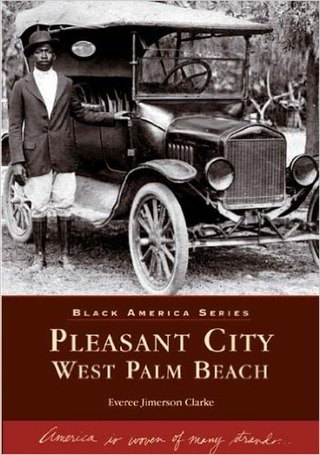
Pleasant City is a neighborhood in West Palm Beach, Florida north of 15th Street, and east of Dunbar Village and the Florida East Coast Railway. Established in 1905 and incorporated into the city limits in 1912, it was developed for African-American workers who were employed at area hotels and other businesses.
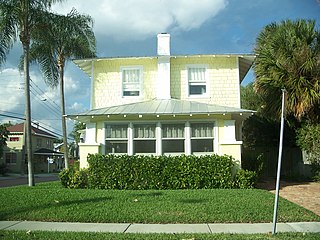
The Mango Promenade Historic District is a U.S. historic district located in West Palm Beach, Florida. The district is bounded by South Dixie Highway, Austin Lane, Coconut Lane, and Cranesnest Way. It contains 125 historic buildings.
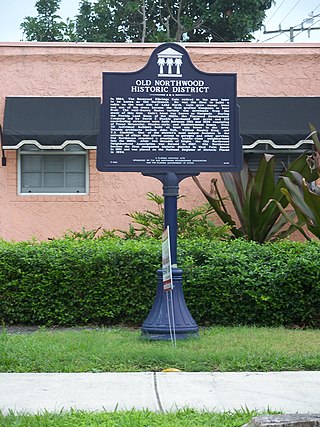
The Old Northwood Historic District is a U.S. historic district located in West Palm Beach, Florida. The district is bounded by Broadway, North Dixie Highway and 26th and 35th Streets. It contains 320 historic buildings.

The Hurricane of 1928 African-American Mass Burial Site is a pauper's cemetery and mass grave in West Palm Beach, Florida. It is listed on the U.S. National Register of Historic Places. The cemetery is situated near the junction of 25th Street and Tamarind Avenue between I-95 and U.S. Route 1. The site is the location in which 674 bodies of African Americans or those of an unknown race were buried following the 1928 Okeechobee hurricane, while most of the white victims of the storm received a proper burial at Woodlawn Cemetery due to segregation laws.

The Dixie Crystal Theatre is a historic site in Clewiston, Hendry County, Florida. It is located at 100 East Sugarland Highway. It first opened in 1941. In 1998, it was added to the U.S. National Register of Historic Places.
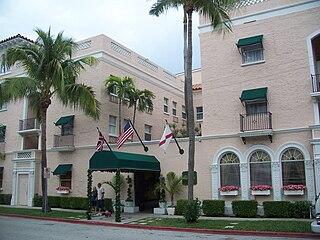
The Vineta Hotel is a historic hotel in Palm Beach, Florida. It is located at 363 Cocoanut Row. On August 21, 1986, it was added to the U.S. National Register of Historic Places.

The Breakers Palm Beach is a historic, Renaissance Revival style luxury hotel with 534 rooms. It is located at 1 South County Road in Palm Beach, Florida. During the 1895–96 winter season, business tycoon Henry Flagler opened the first Breakers resort, then the only oceanfront lodging south of Daytona Beach, to accommodate additional tourists due to the popularity of his Royal Poinciana Hotel. Known as the Palm Beach Inn upon its original opening, it was renamed The Breakers in 1901 after guests requested rooms "over by the breakers". While the Royal Poinciana Hotel permanently closed in the 1930s due to the Great Depression, The Breakers became a primary resort in Palm Beach, hosting many famous guests throughout the years. The current structure is the third incarnation of the hotel, having opened in December 1926 following two earlier structures on the same site that burned down in 1903 and 1925.

The Old Lake Worth City Hall, also known as the Lake Worth City Hall Annex, is a historic site in Lake Worth Beach, Florida. It is located at 414 Lake Avenue.

The Professional Building is a historic site in West Palm Beach, Florida. It is located at 310 South Dixie Highway. On October 24, 1996, it was added to the U.S. National Register of Historic Places.

This is a list of the National Register of Historic Places listings in Palm Beach County, Florida.

The Clematis Street Historic Commercial District is a U.S. historic district located in West Palm Beach, Florida. The district runs along the 500 Block of Clematis Street. It contains 12 historic buildings.
Harvey and Clarke was an American architectural firm formed by Henry Stephen Harvey and L. Philips Clarke in West Palm Beach, Florida, in 1921. The firm was active in South Florida for only a few years, but in that time designed a number of distinctive homes, apartments, churches, and commercial buildings. Harvey was a member of the West Palm Beach Planning Commission. An additional Firm member and staff was Gustav Maass, who designed several local railroad stations, and later became a noted South Florida architect in his own right.
The history of West Palm Beach, Florida, began more than 5,000 years ago with the arrival of the first aboriginal natives. Native American tribes such as the Jaegas inhabited the area. Though control of Florida changed among Spain, England, the United States, and the Confederate States of America, the area remained largely undeveloped until the 20th century. By the 1870s and 1880s, non-Native American settlers had inhabited areas in the vicinity of West Palm Beach and referred to the settlement as "Lake Worth Country". However, the population remained very small until the arrival of Henry Flagler in the 1890s. Flagler constructed hotels and resorts in Palm Beach to create a travel destination for affluent tourists, who could travel there via his railroad beginning in 1894.
Palm Beach County is a county in the southeastern part of the U.S. state of Florida. Its history dates back to about 12,000 years ago, shortly after when Native Americans migrated into Florida. Juan Ponce de León became the first European in the area, landing at the Jupiter Inlet in 1513. Diseases from Europe, enslavement, and warfare significantly diminished the indigenous population of Florida over the next few centuries. During the Second Seminole War, the Battles of the Loxahatchee occurred west of modern-day Jupiter in 1838. The Jupiter Lighthouse, the county's oldest surviving structure, was completed in 1860. The first homestead claims were filed around Lake Worth in 1873. The county's first hotel, schoolhouse, and railway, the Celestial Railroad, began operating in the 1880s, while the first settlers of modern-day Lake Worth Beach arrived in 1885. During the 1890s, Henry Flagler and his workers constructed the Royal Poinciana Hotel and The Breakers in Palm Beach and extended the Florida East Coast Railway southward to the area. They also developed a separate city for hotel workers, which in 1894 became West Palm Beach, the county's oldest incorporated municipality. Major Nathan Boynton, Congressman William S. Linton, and railroad surveyor Thomas Rickards also arrived in the 1890s and developed communities that became Boynton Beach, Delray Beach, and Boca Raton, respectively.




















